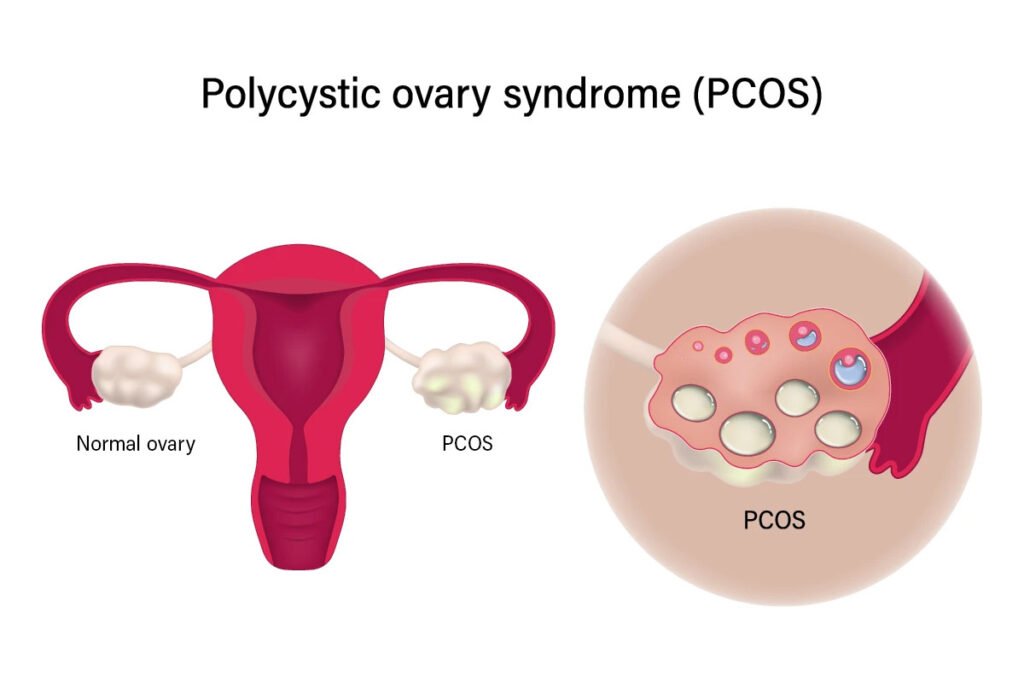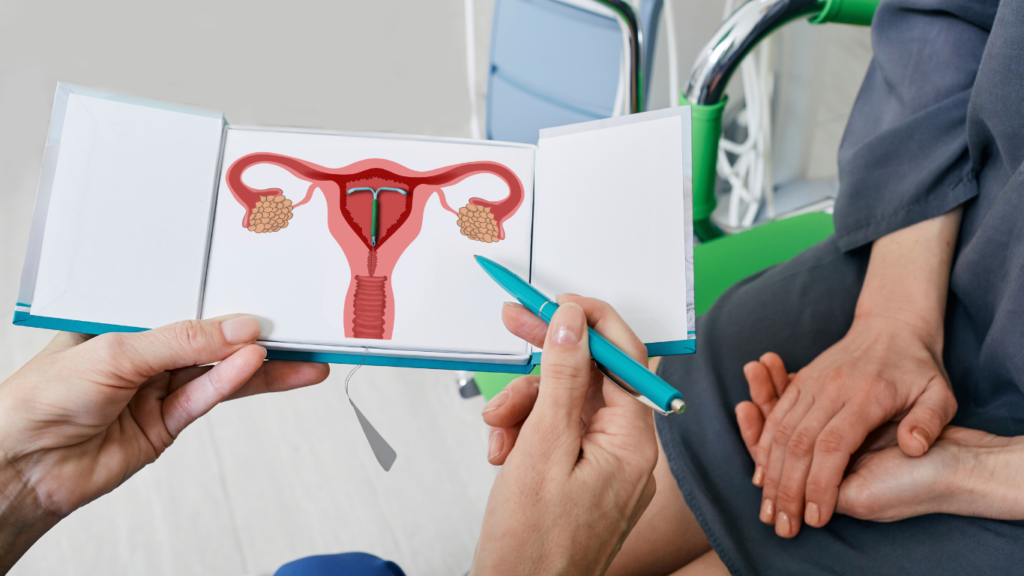Polycystic Ovary Syndrome (PCOS) or Polycystic Ovarian Disease (PCOD) is a common hormonal disorder among women of reproductive age. While the terms PCOD and PCOS are often used interchangeably, PCOD refers to the presence of multiple immature or partially mature eggs in the ovaries, while PCOS encompasses a broader spectrum of symptoms, including irregular periods, acne, weight gain, and infertility. Many women in Hyderabad and worldwide suffer from PCOD, but with timely diagnosis and appropriate treatment from the best gynecologist in Hyderabad, it is possible to manage the symptoms and lead a healthy life.
What is PCOD?
PCOD is a condition in which a woman’s ovaries produce immature or partially mature eggs, leading to the formation of multiple cysts in the ovaries. These cysts may disrupt the balance of hormones, particularly estrogen and progesterone, causing various symptoms like irregular periods, weight gain, and infertility.
Many women remain unaware of their condition because the symptoms of PCOD can be mild or mistaken for other health issues. Consulting the best gynecologist in Hyderabad is critical to diagnosing the condition early and implementing effective treatment.
Symptoms of PCOD
Women with PCOD may experience a variety of symptoms, which can vary in severity. These include:
- Irregular Periods: One of the most common symptoms of PCOD is an irregular menstrual cycle, with periods being too frequent, too infrequent, or absent altogether.
- Excess Hair Growth (Hirsutism): Due to elevated androgen (male hormone) levels, women with PCOD may experience excessive hair growth on the face, chest, or other parts of the body.
- Acne: PCOD can cause hormonal imbalances, leading to severe and persistent acne, particularly on the face, back, and chest.
- Weight Gain: Many women with PCOD struggle with weight gain, particularly around the abdomen. Weight gain is often difficult to control due to insulin resistance, a common feature of PCOD.
- Infertility: The hormonal imbalances caused by PCOD can interfere with ovulation, making it difficult for women to conceive. Infertility is one of the main reasons women seek treatment for PCOD.
- Thinning Hair: Hair thinning or loss on the scalp is another common symptom, often referred to as female pattern baldness.
- Mood Swings and Depression: PCOD can affect mental health, leading to mood swings, anxiety, and depression due to hormonal changes and the emotional impact of physical symptoms like weight gain and acne.
Causes of PCOD
The exact cause of PCOD is not fully understood, but it is believed to be influenced by a combination of genetic and environmental factors. Some potential causes include:
- Insulin Resistance: Many women with PCOD have insulin resistance, which means their bodies are less responsive to insulin, leading to higher insulin levels. This can contribute to weight gain and increased androgen production, worsening PCOD symptoms.
- Genetics: PCOD often runs in families, suggesting a genetic predisposition. If a close female relative, such as a mother or sister, has PCOD, the chances of developing the condition are higher.
- Hormonal Imbalance: Women with PCOD have higher levels of androgens (male hormones) and lower levels of progesterone, which disrupts the normal menstrual cycle and can lead to the formation of ovarian cysts.
- Inflammation: Chronic low-grade inflammation has been linked to higher androgen levels in women with PCOD. Excess inflammation may also contribute to insulin resistance and other metabolic issues.
Diagnosis of PCOD
Diagnosing PCOD requires a combination of medical history, physical examination, and laboratory tests. The best gynecologist in Hyderabad will typically perform the following steps to diagnose PCOD:
- Medical History: The doctor will inquire about your menstrual cycle, symptoms, and family history of PCOD or other hormonal disorders.
- Physical Examination: A physical examination may include checking for signs of excess hair growth, acne, or hair thinning. The gynecologist may also examine your weight and body mass index (BMI).
- Blood Tests: Blood tests are essential to measure hormone levels, including androgen, estrogen, and insulin. These tests can help rule out other causes of hormonal imbalances.
- Pelvic Ultrasound: An ultrasound may be performed to examine the ovaries for cysts and check the thickness of the uterine lining. The presence of multiple cysts in the ovaries is a key indicator of PCOD.
Treatment Options for PCOD
Although there is no cure for PCOD, the condition can be managed with lifestyle changes and medical treatments. Here are some common approaches:
- Lifestyle Changes: One of the most effective ways to manage PCOD is through lifestyle modifications, including diet and exercise. Maintaining a healthy weight can help reduce insulin resistance, regulate hormone levels, and improve symptoms. A balanced diet rich in fruits, vegetables, lean proteins, and whole grains, combined with regular physical activity, is recommended.
- Medications: Depending on the symptoms, a gynecologist may prescribe medications to regulate hormones, manage insulin resistance, or promote ovulation.
- Birth Control Pills: Birth control pills can help regulate the menstrual cycle, reduce androgen levels, and control acne.
- Metformin: This medication is commonly used to manage insulin resistance in women with PCOD. It can also help regulate menstrual cycles.
- Clomiphene: If a woman with PCOD is trying to conceive, fertility medications like clomiphene can stimulate ovulation.
- Hair Removal Treatments: For women dealing with excessive hair growth, hair removal treatments like laser therapy or electrolysis may be effective.
- Mental Health Support: PCOD can have a significant impact on mental health, leading to stress, anxiety, or depression. Counseling or support groups can provide emotional support and help women cope with the psychological effects of the condition.
Why Consult the Best Gynecologist in Hyderabad for PCOD?
PCOD is a complex condition that requires a personalized and holistic treatment approach. The best gynecologist in Hyderabad will offer a range of services to help women manage their symptoms, prevent complications, and improve their overall quality of life. Here’s why consulting an experienced gynecologist is essential:
- Accurate Diagnosis: The best gynecologist in Hyderabad will ensure an accurate diagnosis of PCOD through comprehensive testing and evaluation.
- Tailored Treatment Plans: Every woman’s experience with PCOD is unique. An experienced gynecologist will design a treatment plan tailored to the individual’s symptoms, health history, and reproductive goals.
- Expertise in Hormonal Disorders: The best gynecologists have extensive experience treating hormonal imbalances and can provide expert guidance on managing PCOD symptoms.
- Support for Fertility: For women struggling with infertility due to PCOD, the best gynecologists in Hyderabad offer advanced fertility treatments and support to help achieve a successful pregnancy.
- Comprehensive Care: From diagnosing PCOD to managing symptoms and addressing any associated mental health concerns, the best gynecologists provide comprehensive care to support women at every stage of life.
Managing PCOD Beyond Medications: The Role of Holistic Therapies
While medications can help address the symptoms of PCOD, there is growing interest in holistic approaches that complement conventional treatments. The best gynecologist in Hyderabad may recommend a combination of lifestyle changes and alternative therapies to enhance overall health. These include:
- Dietary Adjustments: While a balanced diet is crucial, women with PCOD can benefit from a more customized nutritional plan. A gynecologist may recommend consulting a dietitian to create a PCOD-specific meal plan focused on reducing insulin resistance and controlling weight. A diet rich in fiber, lean proteins, healthy fats, and low in refined carbohydrates can be particularly helpful.
- Herbal Supplements: Some women find relief from PCOD symptoms by incorporating herbal supplements like cinnamon, spearmint, and inositol into their daily routine. These supplements may help regulate insulin levels and promote hormonal balance, but it’s essential to consult with the best gynecologist in Hyderabad before starting any supplement regimen.
- Yoga and Mindfulness: The benefits of yoga extend beyond physical health. Yoga can help reduce stress, regulate hormones, and improve insulin sensitivity. Certain yoga postures, like the bridge pose and reclining bound angle pose, are believed to stimulate ovarian function and balance hormones. Mindfulness practices, including meditation, can also support emotional well-being by reducing anxiety and stress related to PCOD.
- Acupuncture: Some women with PCOD seek acupuncture to help regulate their menstrual cycle and improve fertility. While more research is needed to fully understand its effects, acupuncture has been found to reduce stress, improve blood flow to the ovaries, and balance hormone levels.
Prevention and Long-Term Management of PCOD
Since PCOD is a chronic condition, long-term management is crucial for maintaining hormonal balance and reducing the risk of complications like diabetes and heart disease. The best gynecologist in Hyderabad can offer guidance on lifestyle modifications and regular check-ups to monitor and manage the condition effectively.
- Regular Health Screenings: Women with PCOD are at an increased risk of developing diabetes, high blood pressure, and heart disease. Regular screenings for blood sugar levels, cholesterol, and blood pressure can help detect and manage these conditions early.
- Maintain a Healthy Weight: Weight management is a critical component of PCOD care. Even a small reduction in body weight can help restore normal ovulation and improve symptoms. The best gynecologist in Hyderabad will work with patients to develop a sustainable weight loss plan tailored to their needs.
- Exercise Regularly: Regular physical activity can improve insulin sensitivity, reduce weight, and alleviate PCOD symptoms. Aim for at least 150 minutes of moderate-intensity exercise each week.
- Monitor Emotional Health: Living with PCOD can take a toll on mental health, especially if symptoms like infertility or acne are present. Seeking professional support, whether through counseling or support groups, can help women manage the emotional aspects of the condition.
PCOD is a manageable condition, but it requires ongoing care and attention. By consulting the best gynecologist in Hyderabad, women can receive personalized treatment plans that address both the physical and emotional aspects of the disorder. With the right support, it is possible to lead a healthy, fulfilling life despite PCOD.



